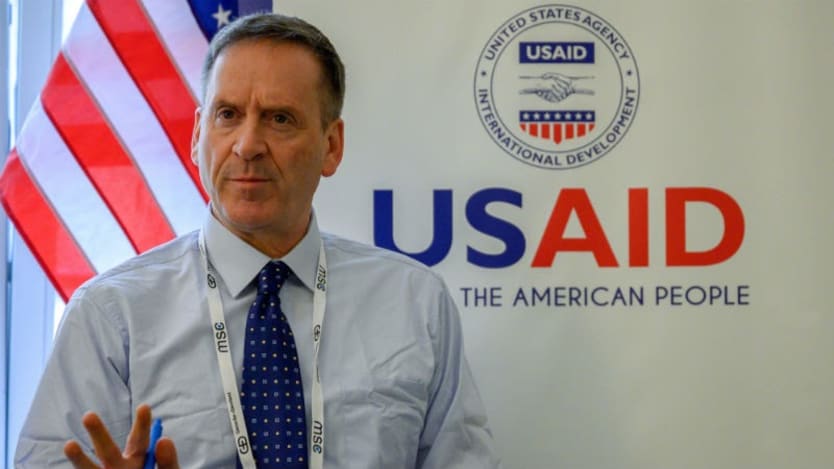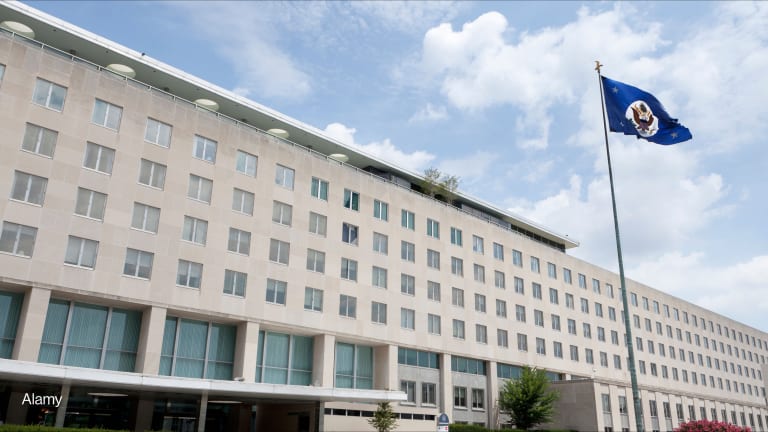
WASHINGTON — Mark Green, administrator of the U.S. Agency for International Development, announced Monday that he will step down from his post on April 10, confirming earlier reports of his impending departure.
“He had the confidence of Democrats and Republicans on Capitol Hill to drive America's global development agenda.”
— Liz Schrayer, president and CEO, U.S. Global Leadership CoalitionGreen has led the agency since August 2017, overseeing a major reorganization that aimed to orient USAID around the goal of building countries’ self-reliance to help them transition away from foreign assistance. Despite repeated attempts by the White House to slash USAID’s budget, he managed to carry out his plans, which were generally well regarded among U.S. development advocates, with support from the U.S. Congress.
US lawmakers reject budget cuts, question USAID policy
Lawmakers made use of their first opportunity to publicly question the Trump administration’s fiscal year 2021 foreign aid budget.
Green wrote to USAID staff on Monday. He began by expressing his concern for staff and their families during the COVID-19 outbreak and sharing an update about agencywide guidance and staff care resources available to support them.
Then Green shared news of his decision to leave USAID and join the private sector.
“My plans to transition have been in the works for a while, and although there is never an ideal time, my primary goal has been to ensure the Agency was strong and our priorities were moving forward,” Green wrote.
After he leaves USAID, Green plans to lead the McCain Institute for International Leadership, a Washington, D.C.-based think tank that was previously led by Ambassador Kurt Volker, President Trump's former special envoy to Ukraine.
U.S. development advocates were appreciative of Green’s leadership of the agency during a tumultuous period.
“He has modernized aid for the better, scaled up private sector engagement, and focused America’s development agenda on self-reliance – while never losing sight of our nation’s humanitarian values. The development community owes him a debt of gratitude,” said Liz Schrayer, president and CEO of the U.S. Global Leadership Coalition, in a statement.
“I think it’s really a testament to Mark’s professionalism, creativity, and smarts that he has been able to achieve a remarkable amount across a range of issues — all the way from humanitarian to private sector, long-term investment. So our hats are all off to him,” said Tom Hart, North American executive director of the ONE Campaign.
Others expressed some trepidation about what might come next.
“My immediate reaction is that it will weaken USAID in this [budget] cycle,” said Conor Savoy, executive director of the Modernizing Foreign Assistance Network.
While initial reports of Green’s plans have suggested that Deputy Administrator Bonnie Glick would assume the role of acting administrator after his departure, multiple people with knowledge of the situation told Devex there is some uncertainty about whether that will happen.
Neither the statement from Green nor the one from Secretary of State Mike Pompeo included any details about the transition plan, and USAID did not respond to a question from Devex about who would assume the administrator’s responsibilities upon Green’s departure.
Throughout his tenure, Green has walked a tight line between the administration’s skepticism of foreign aid and the bipartisan consensus that global development programs should be sustained.
In February, the White House — for the fourth consecutive year — proposed a budget that included deep cuts to U.S. global development programs. As is customary for the person in his role, Green defended the administration’s plans on Capitol Hill earlier this month to lawmakers who showed little interest in supporting the proposal but who nonetheless have continued to express support for Green’s leadership of the agency.
“One of the reasons Mark was so successful was because he had the confidence of Democrats and Republicans on Capitol Hill to drive America's global development agenda,” Schrayer wrote to Devex by email.
“Whoever comes in will have to have the credibility and ability to work with Congress, particularly given lawmakers’ long-standing bipartisan support for foreign assistance. That’s what I will be looking for,” she added.
Savoy noted that Green has also built a good relationship with Pompeo, which enabled him to push back against the White House’s attempts to rescind U.S. foreign assistance funding last year.
USAID’s reorganization efforts remain a work in progress. On Feb. 11, the agency legally established three new bureaus, marking a shift from the design phase to the implementation phase of the transformation agenda that Green has led. Savoy referred to this as “a critical moment, as they’re actually implementing the new bureaus and organizational structure.”
“It leaves open the question of what happens next,” he said.
Green’s departure comes on the heels of last week’s declaration by the World Health Organization that the COVID-19 health crisis meets the criteria for a global pandemic. While there have so far been relatively fewer cases of the virus in many of the countries where USAID’s programs operate, that is widely expected to change.
Green’s successor will face the challenge of leading a dispersed workforce through a massive global health response effort in the midst of a U.S. election year.
“I think we’re all waiting with bated breath for this to hit countries with weaker health systems than have been hit so far. AID has the people, the professionalism, and the know-how to respond to that when it happens — if it happens,” Hart said.
“I do hope that our own domestic response can also leave room for assistance when and where needed,” he added.
Adva Saldinger contributed reporting to this article.








